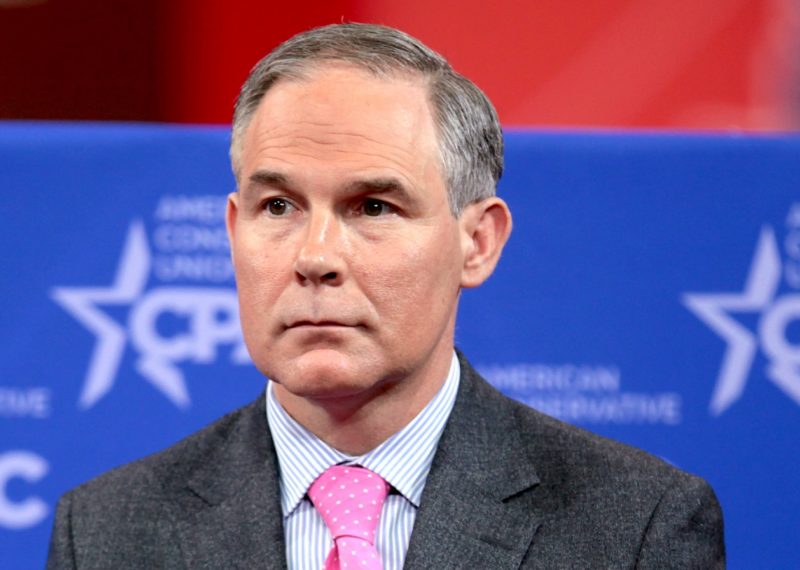EPA chief Scott Pruitt recently announced he would repeal the Clean Power Plan, an Obama-era initiative to limit carbon pollution from power plants, and he promised to “assess whether further regulatory action is warranted.”
Pruitt has been largely successful in undermining the core mission of the agency, and by that measure, he is perhaps the most competent member of the president’s staff. But any consideration of his waffling on climate science makes clear that he is woefully unfit for his office.
Scientists, business leaders and the large majority of Americans are worried about climate change. The transition to electric cars and renewable power is already underway, and there is little that policymakers can do to slow the inevitable demise of coal. And yet, Pruitt isn’t going down without a fight. He has dismantled regulations, championed the U.S. exit from the Paris Agreement and called for an end to the wind energy tax credit — much of it in secret.
Pruitt’s views on climate change are subordinate to policy goals. Because the science is so robust and so many Americans are worried about the problem, he can’t outright deny climate change. Instead, he suggests doubt and disagreement among scientists, using this view to support his deregulatory agenda.
Thus, while his policies clearly conform to his free-market philosophy, his statements on climate science range from inconsistent to incoherent. Pruitt’s climate denial is a form of incompetence. Cabinet officials are supposed to be technocrats, not ideologues. As a technocrat, Pruitt is failing. He is failing to acknowledge basic scientific facts and to produce policy that accords with those facts. Instead, he is producing policy and generating talking points to support those policies. Because the facts come second, his views on climate science are utter nonsense.
It’s real. It’s us. It’s bad. Scientists agree. There’s hope.
Scientists, advocates and climate-conscious politicians broadly share a coherent and scientifically informed view of the carbon crisis. Researchers at Yale and George Mason summarized climate change in five short sentences: It’s real. It’s us. It’s bad. Scientists agree. There’s hope.
It’s real.
Global temperatures have risen around 1 degree C since 1880, with most of the warming happening in the last half-century. No one born after February 1985 has lived through a month where global temperatures were cooler than the historical average. Each of the last three years ranked as the hottest ever recorded.
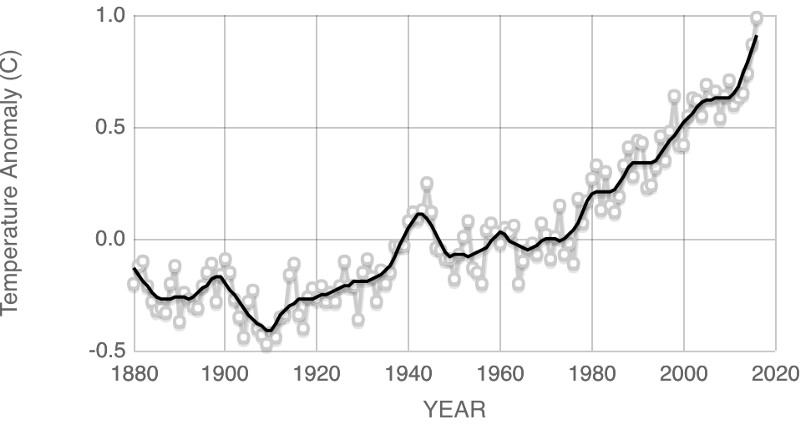
It’s us.
Humans are cranking up the global thermostat primarily by burning coal, oil and natural gas, pouring heat-trapping carbon pollution into the atmosphere. Rising concentrations of carbon dioxide have led to a rise in temperature. Scientists say that evidence linking carbon pollution to climate change is as conclusive as the evidence linking smoking to lung cancer.
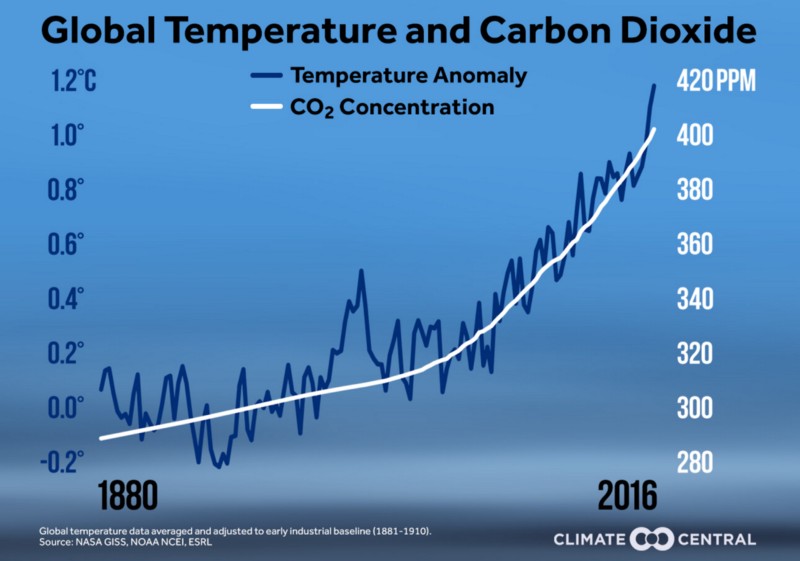
It’s bad.
Rising temperatures are producing oppressive heat, persistent drought, powerful storms and coastal floods. So far, this year has delivered 15 storms, floods, droughts and wildfires that racked up more than a billion dollars in damages, putting 2017 on track to set a new record. If we don’t immediately and drastically reduce carbon pollution, we will endure conditions that were previously unimaginable, a level of warming climate scientist Kevin Anderson has called “incompatible with an organized global community.”

Scientists agree.
Study after study has shown that around 97 percent of climate scientists believe that humans are driving the warming trend. Some scholars say that estimate is too low. A 2016 analysis suggests the number is even higher.
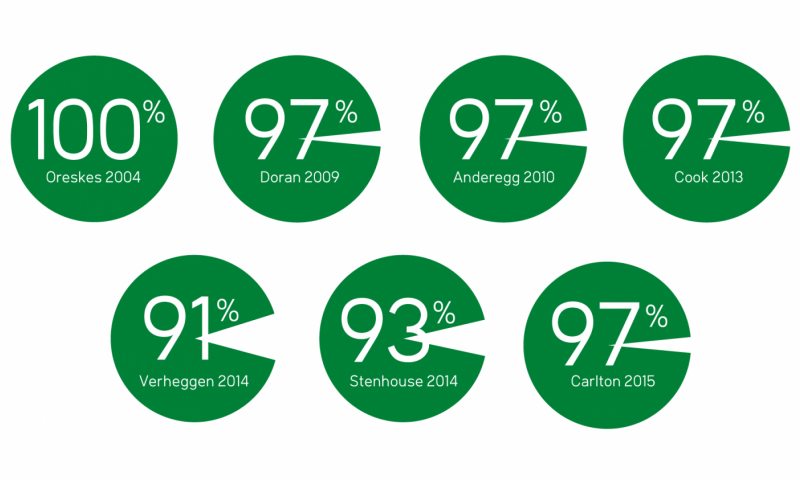
There’s hope.
Despite the grim outlook for the future of life on Earth, there are small signs of hope. Americans are more worried about climate change than ever. Worldwide, energy-related carbon emissions have stayed flat for the last three years, and the cost of clean energy has plummeted. It will be incredibly hard to rein in climate change, but it can be done.
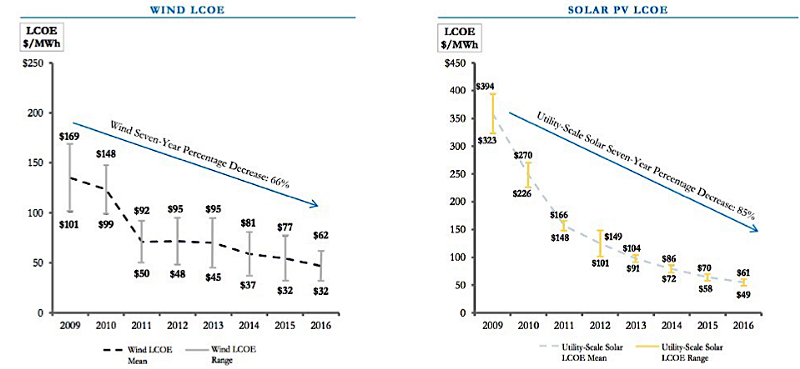
The problem is clear. The solution is necessary, and Americans understand these facts to varying degrees. Among climate deniers, however, there is no coherent view of the issue. Some say the Earth isn’t warming. Others say that it is, but humans are not to blame. Still others say that humans are to blame, but the problem is manageable. Most like to say that scientists disagree.
The only thing these views have in common is that they all point to the same outcome: do nothing. This is the unifying theory of climate change denial. Pruitt offers a case in point.
Pruitt has no coherent view of climate change.
Pruitt has contradicted his own view at every turn. Here are his statements on climate change, broken down according to the rubric laid out above.
It’s real.
Pruitt’s usual talking point is that some amount of climate change is always occurring. In a June press conference he conceded that the Earth is warming.
“I don’t know if you guys caught my confirmation process or not, but… I indicated that in fact, global warming is occurring.”
But later in that same press conference, he falsely claimed that warming stopped two decades ago.
“We’ve actually been on hiatus since the late 1990s, as you know.”
Set aside the fact that this statement is untrue, that recent years have consistently broken temperature records. Either the Earth is warming now or the climate is stable. If the climate is stable, then talk of climate change only makes sense in light of human-caused carbon pollution.
It’s us.
On the one hand, Pruitt has said that it’s hard to determine how much impact humans are having on the climate.
“I think that measuring with precision human activity on the climate is something very challenging to do and there’s tremendous disagreement about the degree of impact.”
On the other hand, Pruitt has suggested that it’s possible to determine exactly how much impact humans are having on the climate. In a June press conference, Pruitt falsely claimed that if countries fulfilled their pledges under the Paris Accord, it would only reduce temperatures by two-tenths of 1 degree C.
“And even if all of the targets were met by all nations across the globe, it only reduced the temperature by less than two-tenths of one degree.”
Set aside the fact that scientists have debunked this claim. It is internally inconsistent. If it is impossible to gauge the human contribution to climate change, then it is also impossible to determine the effect of cutting carbon pollution. What’s more galling is that Pruitt also brags about recent reductions in U.S. emissions, which, by his own reasoning, are meaningless.
It’s bad.
During his Senate confirmation, Pruitt was asked what he thought of the Pentagon’s assessment that climate change is a “threat multiplier” and a “growing security threat.” He said he did not disagree.
“I have no reason to disagree with the statements from the listed security experts.”
At the same time, Pruitt has dismissed the threat of climate change. In a September appearance on Fox and Friends, he said experts can’t assess the threat posed by climate change.
“We know the climate’s always changing. We know that humans contribute to it in some way… Is it unsustainable with respect to what we see presently? Let’s have a debate about that.”
Pruitt has acknowledged that climate change is a “threat multiplier” and “growing security threat,” but he has also suggested that climate change may pose no serious risks. If he’s unsure which is which, he might ask his colleague, Defense Secretary James Mattis, who said that “climate change is a challenge that requires a broader, whole-of-government response.”
Scientists agree.
As part of his Senate testimony, Pruitt said that scientists disagree about climate change. Since then, he has said he will put together a team of deniers who will challenge scientists on climate research. In an interview with Breibart, Pruitt said the subject deserves to be debated.
“What the American people deserve is a true, legitimate, peer-reviewed, objective, transparent discussion about CO2.”
Presumably, Pruitt would look to the outcome of that debate to guide his decision-making as EPA chief. But, in an interview with a Texas radio program, Pruitt said that science should not direct public policy.
“Science should not be something that’s just thrown about to try to dictate policy in Washington, D.C.”
Pruitt’s objection to climate science is that it makes clear we need to stop burning fossil fuels. If he could find an expert who supports the view that fossil fuels are benign, he would happily embrace his findings.
There’s hope.
While Pruitt has dismissed the idea that carbon pollution is responsible for climate change, he has also bragged that the United States has cut carbon emissions through it’s embrace of natural gas, which produces less carbon pollution than coal. He bragged about this in his June press conference.
“We have reduced our CO2 footprint to levels of the early 1990s… And that’s been largely accomplished through innovation and technology, not government mandate.”
And yet later in that same press conference, he said that the United States had little hope of meeting its targets under the Paris Agreement.
“You may not know this, but Paris set targets of 26 to 28 percent. With the entire agenda of the previous administration, we still fell 40 percent short of those targets.”
Pruitt has taken the position that the United States is making progress on carbon pollution — which he says has little to do with climate change — but at the same time, the goals of the Paris Agreement are too ambitious. He says that even if the Paris goals were met, it would have minimal impact on warming, but he also says that it’s impossible to determine the relationship between carbon pollution and climate change. He says that Americans deserve a debate about climate science, but he also says that science shouldn’t inform public policy.
Pruitt has no clear, coherent view of climate change. But it doesn’t matter. His mission is to dismantle the EPA from the inside. He is only willing to accept facts to the extent that they align with that mission.
Jeremy Deaton writes for Nexus Media, a syndicated newswire covering climate, energy, policy, art and culture. You can follow him @deaton_jeremy.

